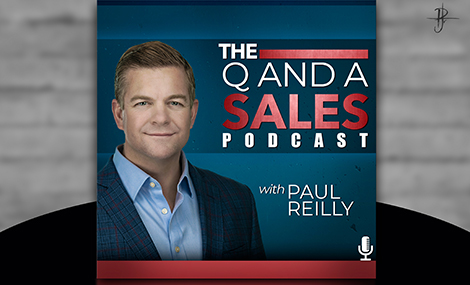Paul lays out four excellent reasons why you, the salesperson, should handle customer complaints.
Show Notes
The seller understands the context of the complaint—what’s going on in the customer’s world.
Salespeople have a lot of skin in the game and will work tirelessly to resolve the problem.
Resolving your customer’s complaint is a relationship-building opportunity.
As the seller, do you want to leave your customer in the hands of someone else when it comes to their satisfaction and loyalty?
Did you enjoy the podcast? Go to iTunes to rate/review the podcast: https://podcasts.apple.com/us/podcast/the-q-and-a-sales-podcast/id1485103513. Click “Listen” then the “ratings and reviews” button.
Visit www.ToughTimer.com to get started on the 30-Day Tough-Timer Challenge!
Order your copy of Selling Through Tough Times from Amazon or Barnes & Noble!
Click here to purchase the latest edition of Value-Added Selling!
Mentioned in the podcast: Strategic Customer Service, by John Goodman.
***
Thank you for tuning in. Our show is updated weekly with the questions you ask. So, please go to the home page to ask the question that you want answered.
Thank you to our production team at The Creative Impostor Studios.
Be sure to follow our show in your favorite podcast app and share this episode with a colleague or friend.
And most importantly…make it a big day.
Why should salespeople handle customer complaints?
(Transcribed from podcast)
On today’s episode, we’re going back to the website. That’s right. Caroline actually asked a question on the website, and Caroline here is the answer. She wanted to know why should salespeople handle the customer complaint. Why specifically, should salespeople handle the customer complaint versus just anyone handling the complaint? Well, on today’s episode, we’re going to tackle that question.
Now, before we get into that, just a reminder to make sure you pick up your copy of Selling Through Tough Times. You know, it’s interesting. During tough times, you’re likely to experience more customer complaints for a myriad of reasons: supply shortages, labor shortages, shortages of resources in general, service levels can tend to dip. So you’re going to have to learn how to manage these customer complaints. In Selling Through Tough Times, we share those thoughts and ideas. So pick up your copy—available wherever you get your books. So, let’s get to it.
Caroline, I think this is a good question. It’s important to think about it. Here is why salespeople need to handle the customer complaint. Number one, sellers are familiar with the context. They understand the customer’s universe, what’s going on in their world, all of their frustrations, all of their opportunities, the problems they’re experiencing. They understand the customer. It’s important that when you’re handling a customer complaint, you understand the full story. And that’s what salespeople do. Since the salesperson was there from the beginning, understanding their needs, presenting a solution, convincing the customer to buy that solution, and then implement it and use it, they’ve got a full understanding of the entire experience. That is important because sometimes when we’re interacting with customers, they may seem to blow up at the smallest hiccup. Something really miniscule will happen, and customers will lose their mind. Well, it may be that is one minute thing that happened after ten other things went wrong as well.
So as a salesperson, you understand all of that. You understand the context of what’s going on in their world: their frustrations, the market dynamics at play. For that reason, you have a broader picture, and you can help manage the complaint with a greater sense of what’s going on.
Tip number two: salespeople will tirelessly look for ways to fix the problem. And it’s just a sheer reality that salespeople have more skin in the game. And I’m not saying that the customer-service professional or the technical person doesn’t want to help solve the issue or fix the problem, but they don’t have as much skin in the game as salespeople.
For example, if you have a salesperson who is, let’s say, getting 20% of their commission from one customer, they’re going to do what they need to do to make sure that customer is 100% satisfied. That’s what they’re going to do. They’re going to find a way to make it happen. They’re going to kick some tail within their company to get people to make things happen. They’re going to grease some skids, whatever analogy you want to use, they’re going to work harder, and tirelessly, to fix the issue. So that’s one of the reasons why salespeople should handle these complaints is just, they have a stronger motivation. They have more to lose, and so they’re going to work harder to solve the problem. And also think creatively on how to solve the problem. Caroline, I would say that’s reason number two.
Now, reason number three. I’m speaking in generalities here, so if you are a customer-service professional or a technical person, don’t be offended with what I’m about to say. Salespeople, in general, are more tactful when they are responding to a customer complaint. And I’ve seen this. I’ve experienced it. Gosh, one company I worked with, actually I sold for this company. I won’t mention their name—I don’t want to out them. But we had a technical department. I was in there one day learning about one of our products, and they got a call from one of the customers. And they had a complaint about one of our products that we sold them. And the technical person actually began the call by saying, “Oh geez, what did you do now to break it?” That’s how they started the call. Imagine how ticked off you would be if you were that customer. Ugh. And at the same company—at the same company—our customer service, and I’m doing the air quotes right now because there was a very little service. One of our customer service professionals would almost yell at a customer, do one of these when the customer would call in, “What do you need?” [spoken with disdain]
Could you imagine? What kind of message does that send? Salespeople tend to be a little more tactful. They’re able to communicate in a way that shows empathy. And I’m not saying that customer-service professionals don’t do that. They do. But salespeople tend to be a little more tactful. So, keep that in mind.
Number four—fourth reason why sellers should handle these complaints. These complaints are relationship-building opportunities. I read a great book several years ago called Strategic Customer Service by John Goodman. And I may have mentioned this on the podcast before. We’ll have a link to that book on the show notes here for this episode. And John Goodman (not Roseanne John Goodman, different John Goodman), in his book, he talked about how, when customers complain and they feel satisfied by the resolution of the complaint, they actually become more loyal. They actually become more loyal. And I think we’ve experienced this. You’ve experienced this, right? I know you’re salespeople, but you’re also customers. When you have a complaint, and you go back to that salesperson and the salesperson, they fix it—they make it right—you do feel a little more loyal. Because I think we know that every salesperson, they can’t be 100% 100% of the time. And at those moments when we do fail, when it doesn’t work out, if you can show them that, “Hey, I can fix this. I can make it right,” you’re going to generate more loyalty.
That’s all, the more reason why salespeople should handle those complaints. Couple things to think about Caroline. Thanks for the question.
Make it a big day.


